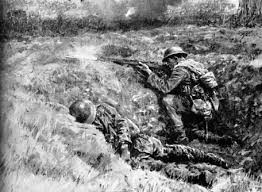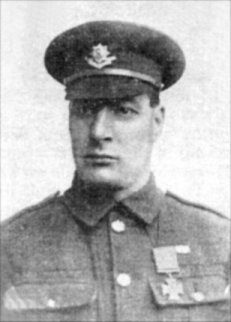
By Richard Boot
The citation for Thomas Turrall in the London Gazette on 9th September 1916 reads:
La Boisselle, France, 3 July 1916, Private Thomas George Turrall, 10th Bn, Worcestershire Regiment.
For most conspicuous bravery and devotion to duty (La Boisselle, France). During a bombing attack by a small party against the enemy the officer in charge was badly wounded, and the party having penetrated the position to a great depth was compelled eventually to retire. Private Turrall remained with the wounded officer for three hours, under continuous and very heavy fire from machine guns and bombs, and, notwithstanding that both himself and the officer were at one time completely cut off from our troops, he held to his ground with determination, and finally carried the officer into our lines after our counter-attacks had made this possible.

Thomas George Turrall was born on 5th July 1886 (sometimes stated as 1885) in Hay Mills Birmingham. His mother registered the birth but like so many at the time was unable to sign her name. The Registrar had to make an assumption on the spelling and noted his surname as “Turrill”.
Thomas’s parents were William, a brick labourer from Coventry and Ellen who married in 1882 and his siblings were William and May. Following the death of Ellen, William Senior remarried a Louisa Slater who had children from a previous marriage. To the children from the couple’s first marriages were added their own; Violet, Rose and Lily. A large family indeed and again very common for the times. The Turralls subsequently moved to Small Heath.
Thomas attended Dixon Road School and subsequently became a painter and decorator. He married Mary Lilian Mansell at Aston in 1913 and Lilian May, was born in May 1914.
The family lived in Yardley and Turrall worked for the Council. In December 1914 he joined the 10thbattalion Worcestershire Regiment as a Private. After training the 10th transferred to France in the summer of 1915. Turrall was joined in France by his younger brother James who was with the Royal Warwick’s.

Whilst in France Turrall was told his wife was seriously ill and he was granted compassionate leave to return to England. When the leave ran out he returned to his unit and shortly after and in December 1915 he learned that Mary had died age 26.
Sadly, he was unable to have further leave to attend her funeral which must have been very distressing and his daughter was taken into the care of the family.
The Germans launched an offensive in early 1916 against the French Army at Verdun and to support their Allies the British 19th Division mounted a counter offensive north of the Somme. The 10th Battalion Worcestershire Regiment was part of this Division although the records appear to show Turrall was at that time in custody serving a disciplinary sentence.
He was released for Active service on the request of Lieutenant Richard William Jennings, the officer he went on to look after later in the action.
On 1st July and following eight days of continuous bombardment the British advanced. In the centre of the action fighting was around two villages, Ovillers and La Boisselle.
The first attack on La Boisselle by the 8th Division failed with heavy losses and the 19th Division was brought up to support a further offensive with a night assault which took place on the night of 2nd July.
The 10th Worcesters formed up with the companies lying down in the open ground waiting for the order to attack. The village was heavily defended by the Germans and under heavy fire the night attack descended into hand to hand combat in the network of dugouts and trenches. Heavy losses were sustained during this action. Commanding officer Lieutenant-Colonel George Arthur Royston-Piggott, Captain H.A. Gillum-Webb, the Adjutant and all the senior officers were all killed or wounded. The village was however secured by the morning of the 3rd with most Germans killed or captured.
Lieutenant Richard William Jennings who had commanded a Battalion Grenade Squad led one of a number of raiding parties which then advanced out of the village. Thomas who was known to Jennings had been part of the Battalion Grenade Squad.
During the morning the raiding party came under fire from machine guns and Thomas who had dropped to the ground when the firing started was the only one of the group to remain uninjured. All others were killed other than Lieutenant Jennings who had a severe wound which had shattered his leg. Thomas pulled Jennings into a shell hole for shelter and bandaged his leg with one of his puttees. He used his entrenching tool as a splint. As this aid was being administered they were bombed by the Germans. Turrall shot two of them dead and the others retired.
During a counter-attack on the village German infantry advanced towards the shell hole occupied by the two men. Jennings had at this time fainted and Thomas was forced to feign death albeit he was prodded by German bayonets.
Once darkness arrived Thomas who had looked after Jennings throughout the day made his way back to the British lines. He carried an unconscious Jennings on his back over the shell marked landscape and at times under fire.
Notwithstanding Turrall’s supreme efforts Jennings died on an operating table in the field hospital He had however dictated an account of his bravery.
The Regiment notes that Thomas wrote to Jennings’ mother giving an account of his last hours:1
“I hope you will not think me taking a liberty writing to you in this manner but I feel it my duty to do so, as I was with him the whole time and I think you would like to hear the part we played. I must first of all congratulate you in possessing such a plucky son, for he led our company with unflinching pluck that we were not long in taking the enemy’s front line.
I might say that when we reached it we came across a dugout held by the Huns. Here your son remarked: “Give me a bomb I will clear them out”. He did so. From there we went on to the second line. This proved to be an easy thing for we did not find anyone there, so that made us more enterprising. We were not long before we were in the third line. This is, I am sorry to say, the starting of our hard times, for it was here he received his first wound; a rifle shot in the muscle of the left arm.
Nothing daunted him. He kept on until he received another wound, a bomb this time which caught him in the right thigh. I might say that it was from this time that we found ourselves practically cut off from the remainder of the battalion. It was here that a brother officer advised your son to seek medical aid, but he very pluckily refused, although had he chosen to act as advised I am afraid he could not have done so as we two were now completely cut off. It was advisable to get what cover we could. So, we retired to a shell hole some distance in the rear. In doing so your son, I am sorry to say, received two more wounds, one in the right knee, and the other shattered his left leg a little below the knee. As we could get no further I did all I could for him, using my entrenching tool handle and bayonet scabbard as splints, and my puttees as bandages. It is hard to tell you that we were obliged to remain like this for something like three and a half to four hours before I at last carried him in.
How he bore his pain was surprising, for he continually chatted and smoked with me until I at last managed to get him to the dressing station. It was here that we parted, but not without him thanking me for the part I played. I am sure in the success of the Worcesters at (blanked by censor) your son played a very prominent part although badly handicapped by his wounds. Hoping this little but thrilling account will afford you some small consolation in your great loss and at the same time sending mine and all his comrades’ sympathy”.
Mrs Jennings wrote to Turrall’s mother:
“”Will you let me know when your brave son is in England? I will go anywhere in England to see him and give him some special thing in memory of Lieutenant Jennings. Your son must be a hero and so strong, for my son was over six feet”.
Turrall’s VC was gazetted on 9th September 1916 and it was reported that he was pulled out of the lines to meet King George V who was visiting the troops in France. Turrall met the King again when he formally received his VC in January 1917 at Buckingham Palace.
Thomas returned to active service with the Worcesters and was demobilised in April 1919. At that stage he had fought at Arras, Loos, St Quintin, La Bassee and Cambrai; indeed, right up to the Armistice.
After all of which he returned to his job as a painter and decorator. You can only wonder how someone would be able to adjust to that change!
His home city of Birmingham welcomed back their hero and amongst the events a testimonial football match was played for Thomas at Birmingham City’s St Andrews ground on 10th May 1919.
Thomas remarried, this time to Daisy May Davis in 1920 and that same year attended Buckingham Palace at a reception for recipients of the Victoria Cross. Present were King George V and Queen Mary. Over the years Turrall attended many events and receptions for VC winners including one at the Council House in Birmingham in 1934 where, for HRH The Prince of Wales he formed the Honour Guard with other VC winners; Arthur Vickers (see Chapter 11), Henry Tandey from Leamington and George Onions from Wolverhampton.
In 1956 the drawing shown in this chapter by Gilbert Holiday of Turrall defending the shell hole against the Germans was presented to the Regiment.
Thomas was also one of the many holders of the VC who were on parade in Hyde Park on 26th June 1956 for the centenary of the Victoria Cross and was present when HM Queen Elizabeth held a Garden Party in the grounds of Buckingham Palace on 17th July 1962 for holders of the VC.
In that same year it is perhaps sad in some respects to note that he sold his VC medal group to the Worcestershire Regiment for £500 to eke out his pension for himself and wife Daisy.
Thomas lived in the Hall Green area until his death aged 78 on 21st February 1964 in Selly Oak Hospital.
By all accounts, well liked and respected, popular and ‘’ a character’’. But clearly a very special man who put himself in harm’s way to care for a young subaltern and get him back to safety.
Truly remarkable!
